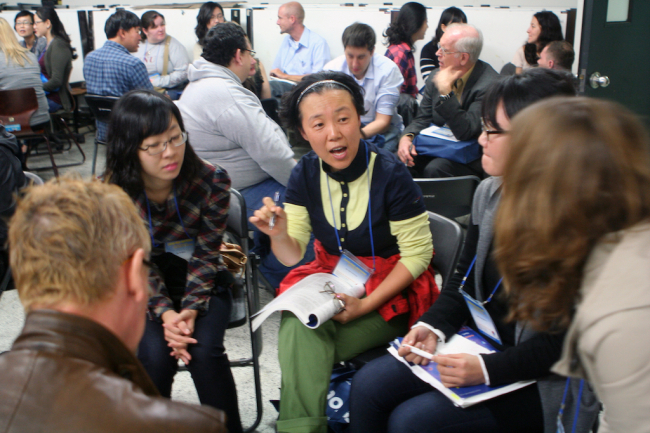Korea Teachers of English to Speakers of Other Languages will hold its 2014 national conference in Daegu this weekend with a focus on practical advice for real-life classes.
The annual conference is generally more practical than KOTESOL’s international conference, according to conference cochair Rob Dickey, but this time it will be “even more practical than usual.”
“Instead of talking about theoretical classrooms or ideal classrooms, we are saying, ‘You’ve got 32 students in front of you, what do you do? They are not all the same level,’” he said.
“We might have three classes with the same (content) ― one is early morning and the students are sleepy, one is late in the afternoon and the students are sleepy, one is right before lunch and the students are hungry ― how do we deal with these fundamental real-life problems?”
The conference will involve more than 60 presentations and workshops, including plenary speeches from Miyagi Gakuin Women’s University professor Marc Helgesen and Charles Brown, professor of applied linguistics and TESOL at Meiji Gakuin University, Tokyo.
 |
| Participants discuss English teaching techniques at a previous KOTESOL conference. (KOTESOL) |
Brown will explore solutions to the restrictions of ministry-mandated textbooks with a focus on vocabulary. He will discuss ways to overcome these problems and include more useful and engaging vocabulary in lessons.
Helgesen, who also wrote the “English Firsthand” series, will discuss the benefits of multisensory input and ways of using input from the five senses in the classroom.
There will also be a webinar by Anaheim University TESOL professor Ken Beatty on authenticity in the classroom, in which he will explain how to make classroom materials and language as natural as possible.
There will also be a practical side to this year’s research presentations, with a focus on action research. Rather than concentrating on laboratory-type experiments or reviews of literature, action research is carried out by teachers who work full-time in the classroom but seek solutions to the problems they encounter.
“It’s based on real-life problems and real-life solutions. Every once in a while you will get someone who says, ‘Well we did this but it didn’t work so then we tried this,’ to get two or three options in one class,” said Dickey. “And, ‘What didn’t work in my class might work in yours, but this is what I tried.’”
“It could be an old approach but maybe one that you didn’t use before: We heard about this technique that was being used in the USA; will it work in a Korean high school? Let’s try. … It’s problem-driven.”
KOTESOL president and conference chair Peadar Callaghan suggested that rather than looking to the latest technology or methodology to solve their problems, teachers should take time to review all the options developed over the last 50 years and choose the most appropriate solution.
“Most language educators in Korea are expected to produce results without expensive technology, or same-level learner groups,” he said.
“Yes, there are a few language-learning programs that use specialized learning approaches for their ideal students, but this is not the norm, and we have to deal with realities.”
The conference takes place Saturday at the Global Plaza of Kyungpook National University in Daegu. For more information, visit koreatesol.org/nc2014.
By Paul Kerry (paulkerry@heraldcorp.com)

